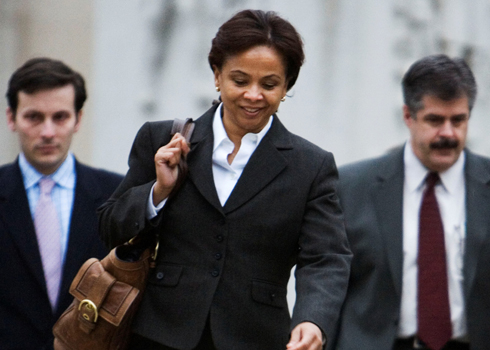Nicholas A. Marsh, the federal prosecutor who had been involved in the botched prosecution of the late Sen. Ted Stevens and took his own life over the weekend, felt abandoned by some at the Justice Department because of its handling of a probe into allegations of misconduct, friends tell TPMMuckraker.
Marsh felt that he had been sidelined during the course of an investigation into allegations of prosecutorial misconduct while other colleagues also under investigation were able to continue prosecuting cases, according to friends familiar with Marsh’s views. They say waiting for the investigation to play out its course was difficult for him to handle.
“Particularly when you’re dealing with someone like Nick, who is someone with the utmost character and integrity… for him to sort of have to sit by and wait for this investigation to run its course while he is waiting to have is name cleared is very hard for him,” Josh Waxman, a longtime friend who was a summer law associate with Marsh, told TPMMuckraker.
“I think he felt scapegoated,” one friend speaking on the condition of anonymity told TPMMuckraker.
Stevens, the longtime Republican Senator from Alaska, was convicted in October 2008 of lying on Senate financial disclosure forms about gifts he received, including a massage chair and a stained glass window. But prosecutorial misconduct in the case — including the prosecution’s admission that it withheld from the defense team notes from an interview with a witness that contradicted what he eventually said on the stand — convinced Attorney General Eric Holder to request that the charges be dropped in the spring of 2009. At the trial, Marsh had defended the prosecution, arguing the testimony wouldn’t have changed the basic issues in the case.
The prosecutors were taken off the case, and the judge appointed a special prosecutor to look into whether the team was guilty of misconduct for failing to hand over evidence. A separate probe was opened by DOJ’s Office of Professional Responsibility.
The circumstances of Marsh’s suicide on Sunday were not made public, but Beverley Fields of the Office of the Chief Medical Examiner told TPMMuckraker on Monday that the case and manner of the death would be available shortly.
While the ongoing investigation was expected to wrap up soon and reportedly focused on misconduct by prosecutors besides Marsh, friends said he took the situation pretty hard.
Waxman said he thought Marsh was doing well in his most recent job in the DOJ’s Office of International Affairs, which sent Marsh traveling around the world. Two weeks ago, Marsh was in Moldova, and a previous DOJ trip had brought him to Budapest, said Waxman. He also wanted to emphasize that Marsh had worked on several important public corruption cases well before the Stevens trial.
“He was not just the Stevens case. He had a long career of working on public corruption cases and great success in prosecuting,” Waxman said. “I just want to make sure that people understand that his career was much more than just the Stevens case and that he had a long record of success.”
But Marsh was bothered by the fact that William Welch III and Brenda Morris, two other prosecutors who were also under investigation, were allowed to continue prosecuting cases. Morris popped up in a corruption case in Alabama, while Welch is stationed in the U.S. Attorney’s office for the District of Massachusetts and has a role in the prosecution of some high-profile leak cases.
“When the shit hit the fan — regardless of what happened or who was at fault — in a high profile case like this, the mistakes go higher up the chain,” the friend told TPMMuckraker.
“It seems odd that if four people are under investigation for possible criminal wrongdoing, two would be taken out of litigation, and two would continue on working on high profile matters,” the friend said. “That raised questions with Nick.”
Another close friend of Marsh’s, former prosecutor Joshua Berman, told The Wall Street Journal that Marsh was anxious that the probe had dragged on. “He became so concerned that the inaction of these bureaucrats would lead to something bad. Their inaction absolutely caused distress for Nick,” Berman said.
The Justice Department declined to comment on why the other prosecutors under investigation have been treated differently, but referred TPM to a statement they released yesterday, attributed to Assistant Attorney General Lanny A. Breuer of the Criminal Division:
“Our deepest sympathies go out to Nick’s family and friends on this sad day. The Department of Justice is a community, and today our community is mourning the loss of this dedicated young attorney.”
The Stevens case was the last public integrity case Marsh worked on. Marsh was reportedly happy to get away from the headlines in new position, but soon after he entered the office, the high profile case of Roman Polanski fell on his desk. Switzerland allegedly refused to extradite Polanski due to a paperwork error.
Marsh’s lawyer Robert Luskin said that the special prosecutor looking into allegations had been “thorough, but also fair and utterly professional” in the probe.
“This is an awful tragedy, but I don’t know anyone who is inclined to assign personal blame,” Luskin told TPMMuckraker in an e-mail. “To the contrary, one of the lessons here is that being the subject of accusations is a very cruel process even when conducted fairly.”
Henry Schuelke III, the special prosecutor looking into the allegations of prosecutorial misconduct, said in an e-mail to McClatchy Newspapers that he had no comment other than to express “shock and condolences to Mr. Marsh’s family.”
The Public Integrity Section at DOJ was recently took over by longtime federal prosecutor Jack Smith, who now serves as chief.
[Ed note: This post was edited after publication.]






